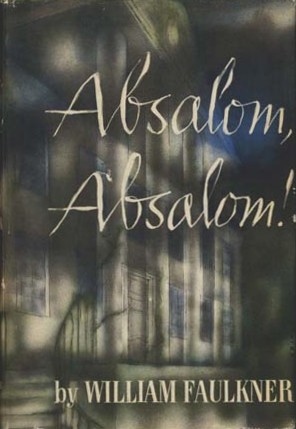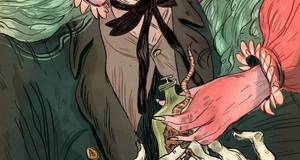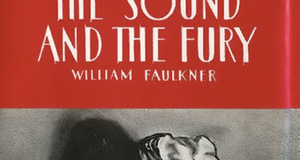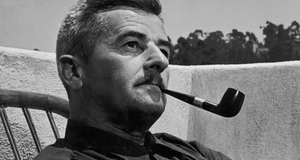Featured Article:Faulkner's "Absalom, Absalom!" and the Mysterious Rosa Coldfield
By
2010, Vol. 2 No. 11 | pg. 1/1
KEYWORDS:
 First edition cover of William Faulkner's Absalom, Absalom! First edition cover of William Faulkner's Absalom, Absalom!Plot Overview of Absalom, Absalom!William Faulkner’s Absalom, Absalom! begins in the year 1833, when the stranger, Thomas Stupen, rides into Jefferson, Mississippi, and promptly begins building himself an empire. He builds a plantation named Stupen’s Hundred, takes a wife, Ellen Coldfield, and has two children, Judith and Henry. Ellen’s much younger sister, Rosa, comes to live at Stupen’s Hundred after Rosa’s only guardian, her father, nails himself in the attic and throws the hammer out the window in protest of the Civil War. Despite attempting to fulfill Ellen’s deathbed wish to look after Judith and Henry, Rosa finds herself continuously marginalized and therefore must live vicariously through Judith, especially during the occasion of Judith’s engagement to Henry’s friend, Charles Bon. When Stupen insists the engagement be broken and Henry, Stupen’s heir to the fortune, storms out of the house renouncing his birthright, Stupen’s dynasty begins to crumble. The Civil War ruptures the South; Charles Bon and Henry enlist, as do Stupen and Quentin’s grandfather, General Compson. Stupen seeks out Henry to explain that Charles is Judith’s half-brother, and also half-black. After the war, Henry kills Charles at the gates of Stupen’s Hundred and exiles himself. Stupen attempts to rebuild the dynasty ruined by war. He proposes marriage to Rosa, with one stipulation: Rosa must give Stupen a male heir before the wedding. Rosa refuses. Stupen has an affair with Milly Jones, the granddaughter of Wash Jones, a man who lives on Stupen’s property. Milly gives birth to a girl. When Stupen denounces her and her daughter, Wash Jones kills him. In 1910, Rosa Coldfield, now a living artifact of the Old South, tells the Stupen story to Quentin Compson. She asks Quentin to return with her to Stupen’s Hundred, for she suspects someone has been living there. Quentin agrees, and they enter Stupen’s Hundred to find Henry and Clytie, another half-black Stupen child. When Rosa tries to reach out to them again three months later, a paranoid Clytie sets the plantation on fire, killing herself and Henry, leaving Rosa the single survivor of the past.Absalom, Absalom! focuses on the narration of the events rather than the events themselves. The story is narrated through three times, first by Rosa, then by Quentin’s father Mr. Compson, and finally by Quentin and his college roommate, Shreve. Each narration shows the bias and values of the storyteller. Literary AnalysisRosa’s winding, complex, and confusing narrative often leaves readers and critics with questions of Rosa’s truthfulness to her story and her motives for changing it. The recent critics have come to many different conclusions about Rosa. Critics cannot seem to agree with even the basic ideas of Rosa’s motives. Deborah Garfield argues in her article “To Love as ‘Fiery Ancients’ Would” that Rosa never married because she longed after an ancient eros type of love and would not settle, even though she was riddled with a desire to marry. Olivia Edenfield claims Rosa lacks a role to fulfill even though she desperately searches for one in “’Endure and then endure’: Rosa Coldfield’s Search for Role in William Faulkner’s Absalom, Absalom!” Patrick O’Donnell attributes Rosa’s significant loss in “Sub Rosa” not to the lack of a role, but to the lack of an identity. In her article “’Listen to the being ghosts’: Rosa’s words of madness that Quentin can’t hear,” Betina Entzminger argues that Rosa, a hysteric, tells her story as a stern warning to Quentin whose own hysterics will eventually cause his death shortly after the events of the book. Laurel Bollinger states in “That Triumvirate Mother-Woman” that Rosa is a strong character and the downplay of Rosa’s narrative from the critics was something Faulkner never intended. Alain Geoffroy in “Through Rosa’s looking-glass: narcissism and identification in Faulkner’s ‘Absalom, Absalom!’” sees Rosa as a fully narcissist character with her entire worldview centered around herself and her own wants. In “Be Stupen’s Hundred: Imaginative Projection of Landscape in ‘Absalom, Absalom,’” Thadious Davis argues that Rosa and the other characters are extensions of their settings; she ties ghostly Rosa with the ghostly 1910 ruins of the Coldfield House and Rosa’s imaginative interpretation of Stupen to her interpretation of the “suitably demonic” Stupen’s Hundred (9). The variation in the critics’ interpretation and their argumentative structure provide windows into what literary or social theories they find the most applicable for studying Absalom, Absalom! For this study, the critic’s motives for interpretation will be analyzed upon their discussions of Rosa’s relationships with Charles Bon and Thomas Stupen. From the many critics who produce scholarship on Rosa, the texts of Laurel Bollinger, Olivia Edenfield, and Alain Geoffroy provide the most polarizing speculation on the mystifying character of Rosa Coldfield. Laurel Bollinger’s “That Triumvirate Mother-Woman: Narrative Authority and Interdividuality in Absalom, Absalom!” explores power in the novel, particularly Rosa’s power as the storyteller to alter the events of history. Bollinger’s critique would most likely be classified as a feminist text, however, the focus tends to be less on the gendered women’s struggle in the Civil War Era South and more about a discourse’s power to make and unmake events of history, albeit a power given to a woman, who under the social society of the Old South, has no power. Bollinger notes that the women in the novel, including Rosa, “seem to have power over their own narrative futures—and in this, their alternate narration threatens to revise the novel as a whole” and further, the women even threaten to take the story from Faulkner himself. Bollinger’s is one of the only articles in which the critic suspects Rosa, a woman, to have such an extraordinary amount of power from her narration that she, a fictional character, threatens to overtake the author. While Bollinger’s critique takes the framework of a feminist text, she explores the power of Rosa’s narration to make history, more so than her struggles as a Civil War Era woman. Many critics, if not all, consider Rosa a “failed narrator.” She fails to make a connection with her audience, Quentin, and she fails to relate the facts of the story correctly. Her narration, which the readers should consider a reputable story, considering she lived the events, becomes the narration the characters and readers trust the least. In this failure, Bollinger implies that Faulkner empowers Rosa to tell history as she sees fit. Bollinger recognizes about Rosa’s story-telling that the narration, not necessarily the history, proves problematic and that “narrative authority in this text assumes a spectral quality that reinforces our interest in it, just as the now-absent subject has claimed our imagination.” Bollinger and Faulkner recognize the limitations of a narration like Rosa’s: one perspective, limited knowledge, long distances of time. The story must expand beyond Rosa’s narrative scope, otherwise, no interest would spark the reader’s inquiries, and even the other characters in the text obsess over the woman’s tale. Bollinger’s fascination with Rosa’s power lies at the heart of the art of storytelling and re-writing historical events, a subject Hayden White focused on in his essay entitled “The Historical Text as Literary Artifact.” In his essay, White explains creation of the story part of history purely belongs as a function of the author. He says that “[h]ow a given historical situation is to be configured depends on the historian’s subtlety in matching up a specific plot structure with the set of historical events that he wishes to endow with a meaning of a particular kind” (1716; italics removed). He further ushers in the literary, authorship aspect of storytelling by saying, “this is essentially a literary, that is to say fiction-making, operation” (1716). In White’s opinion, historians who overtake the facts fail. Historians who connect the facts beautifully succeed. In other words, for White, authors write the real history by picking, choosing, and relating the facts. White argues that many historians write with bias (1712), and no Rosa scholar would disagree that, as a historian, Rosa certainly asserts her opinion as fact and allows her emotion to overtake the actual facts of the story at times. When Rosa allows her emotions to overtake fact, she fails as a narrator and her words lose trust. However, sometimes, the problem stems from the way Rosa relates the facts rather than the history itself. Rosa’s narrative in this instance dangerously constricts the facts because “the problem emerges more from the narration than from the narrative—that is, from the language of the telling rather than the content of what is told” (Bollinger). Bollinger’s and White’s articles explore the power of Rosa and all narrators by exposing where history is written: in the minds of the historian. Bollinger explores Rosa’s power to “unmake” Charles Bon by simply not discussing him in the ultimate act of historian power. This idea stems directly from White’s writings expressing the idea that events in a history can be made by either suppressing or subordinating historical facts, something Rosa does to an alarming extent (1715). Therefore, Bollinger believes that Charles Bon dies twice: once, literally, at the wrong end of Henry’s bullet, and once, figuratively, in the tight lips of Rosa. In White and Bollinger’s view, Rosa makes the decision to write Bon out of history deliberately, not by accident, as many other critics believe. Bollinger gives Rosa much more credit for what comes out of the narrator’s mouth—nothing narrated is accidental. Exploring the role of Rosa as the novel’s historian begs study in a story such as this; Rosa, the oldest and primary source of historical events, is the one person who should have the most credibility but tells the readers and the other characters the least amount of fact. Rosa’s bias toward certain characters replacing her “facts” often lead critics to consider her narration a failure. For White, Rosa’s bias neither benefits nor hinders, as long as she keeps the facts straight. White laments the modern practice of writing the literary aspects of history—the bias—out of the discipline (1729). To study Stupen, Bollinger first mentions his narration style, the way he also acts as a historian. In Bollinger’s mindset, Stupen’s narration mirrors Rosa’s; she claims he also makes no connection with his major audience, General Compson. After making this claim, she makes an interesting observation about Stupen as a historian to the people around him: in attempting to build his empire, Stupen narrates his life, strategically using of history and the absence of history, and creates an image of himself that he cannot fulfill. Bollinger notes that “Stupen himself implicitly recognizes the falseness of his claim to full autonomy.” Bollinger looks at how Stupen shows narrative for all the destruction and confusion it can bring as he uses his mysterious past to his advantage in wielding a mega-empire ultimately destroyed by its own practices. In this way, Stupen also fails as a narrator, but he pays for it dearly. In connecting Stupen and Rosa as failed narrators, Bollinger performs the work of a historian by connecting facts together to create a streamlined narrative. In Olivia Edenfield’s opinion, Rosa’s wandering idleness appears from the lack of a definable role for Rosa to fill. Every one of Rosa’s relations fails: her mother dies in Rosa’s birth, her father locks himself in the attic and starves himself, her aunt abandons the family to elope, her sister Ellen has no use for her, Charles Bon’s relationship with her is completely a figment of her imagination, her niece and nephew take no account of her, and Stupen only needs her as a carrying case for a male heir. Nearly all critics, including Bollinger and Geoffroy, agree that Rosa fails at making meaningful connections in either her life or her narrative, but Edenfield alone says that Rosa desperately seeks a role before she is cast into obscurity: “Rosa spends her life trying to fill the roles that she is denied” (65). Edenfield argues that Rosa’s lack of connection with the people in her life or the audience of her narrative stems from no fault of her own, for she tries intensely to make these connections, but the other people deny her, and therefore, Edenfield’s critique alone highlights Rosa’s lack of connection as a form of extreme victimization. A critic looking at race relations in the novel would place Rosa at a position of power over the slaves; Bollinger and White place the ultimate power in Rosa’s hand as the narrative; Edenfield reduces Rosa to a power-less victim of the more powerful class structures; since Rosa cannot assist any of these power structures in procuring more power, she is cast aside and forgotten. From a closer look at Edenfield’s critique, she appears to argue that one finds solace in belonging to a group, something Rosa has failed to do. Therefore, the isolated Rosa fails to attain happiness; instead, she sinks into extreme loneliness. By taking that notion and formulating it into an idea that Rosa also never fulfills the roles that come with group membership, Edenfield echoes Louis Althusser’s notion that “ideology represents the imaginary relationship of individuals in their real conditions of existence” (1498). Without possessing roles within either Althusser’s Ideological State Apparatuses (ISAs) or the Repressive State Apparatuses (RSAs), Rosa lives as an outcast. Althusser, in his article “Ideology and Ideological State Apparatuses” takes a Marxist approach to the individual and society. Rosa does not procure a role in any of the general ISAs, which Althusser identifies as family, religious, educational, legal, political, trade-union, communication, and cultural (1459). As Rosa’s society prevents her from being able to vote, obtain a high education, or reputably procure a job outside the home, the ideologies of legal, educational, political, and trade-union reject her outright. The religious ISA plays a quiet background in the life of Rosa Coldfield. The cultural ISAs of both of the Old South and the New South do not have any use for Rosa and therefore, both cast her aside, and she lives as a woman outside male-dominated power structures. The lack of the family ISA highly affects Rosa. Edenfield infers that “Rosa tells Quentin her story so that he will help her in her final attempt to create a role for herself as aunt,” suggesting that Rosa never fulfills any familial role before the summer of 1910 and must venture outside blood lines in a desperate attempt to conjure a family role she can fulfill (58). Althusser states that each person “is practically provided with the ideology which suits the role it has to fulfil [sic] in class society,” and Edenfield then translates that to understand Rosa’s loneliness and frustration at the specific failure of her familial role (1495). As Althusser argues that subjects of ideologies do not decide vicariously that they wish to be a subject of an ideology, but “are always already subjects,” Rosa’s victimization and abandonment from her family begins at birth (1503). Therefore, for Edenfield and Althusser, Rosa, a product of her birth and society, proves blameless for her circumstances. Since Rosa’s lack of a role frustrates her, she develops a love for Bon, creating in her mind a pseudo-role in a pseudo-relationship. Edenfield deems that “Rosa’s love for Bon comes out of her love for her niece and her own desire to marry and have a family, to experience the love that her life has denied her just as it has kept her from other roles” (61). This concept represents both the family ISA and the cultural ISA; she is an outcast because she has no close family and is forced to create her own family to be culturally accepted. For Edenfield, “the only moment of tranquility in Rosa’s life comes when she is able, for a brief time, to live out a role more sister than aunt when she goes to live with Judith and Clytie after she learns that Henry has shot Bon” (61; emphasis mine). If Althusser’s notion is considered that “it is not their real conditions of existence, their real world, that ‘men’ ‘represent to themselves’ in ideology, but above all it is their relation to those conditions of existence which is represented to them there,” (1499) and that “ideology has a material existence” (1500) or, in other words, ideology materially manifests the beliefs of individuals regardless of their “real world,” then Edenfield correctly says that Rosa “makes a claim for herself through her niece’s experience” (61). Edenfield’s examples provide a close sociological study of the relationships within the characters of the story and the roles they fulfill for each other. With Thomas Stupen, Rosa is actually provided with a chance to take a role in society. Edenfield answers this by explaining the difference of Rosa and Stupen’s ideologies: “Stupen’s proposal that they mate first and marry later awakens Rosa from her dream of ever becoming ‘one’ with him” (63). As for Stupen, Edenfield suggests that, like Bon, she does not love him, but simply has an obsession with her own necessity (62). In a footnote on Rosa’s relationship with Stupen, Edenfield remarks that, “In fact, her desire for a partner is what Rosa is willing to admit to herself. But Stupen has no use for a partner; he wants a breeder” (67). Since Rosa requires a true family ideology with her needed as the primary nurturer and care-taker of the family, she finds no use for Stupen’s proposal, and she denies herself her only opportunity at any happiness. Edenfield’s argument proves the only one to effectively equate both Rosa’s lost frustration and her death as a non-coincidence. Edenfield says that “Rosa Coldfield spends her life trying to define herself by one of the roles provided for women of her generation” and that the fulfillment of one of those roles, that of Henry’s aunt, “is her last chance to define herself, her last hope of fitting into the patriarchy by becoming at the end the aunt that she never has been allowed to be” (65). Her perspective on the text, however, echoing Althusser’s Marxist ideas of societal power, quickly paints Rosa as a powerless victim of “the system” of ISAs and RSAs. While this theory does account for many plot points that other critics do not usually bother with, this view does not take the failures Rosa caused herself into enough consideration. By seeing Rosa’s entire life as instant victimization, Edenfield strips Rosa’s free will. Alain Geoffroy, the only male critic, also provides a different perspective than the abundance of female critics in this study. Alain Geoffroy looks at Rosa from a psychoanalytic viewpoint and sees Rosa as a wholly narcissistic woman, the complete opposite of Edenfield’s victimized Rosa. Of course, in the psychoanalyst perspective, the main characterization of Rosa has to consist of an internal problem, wholly devoid of outside events. While Edenfield’s Marxist critique takes her focus on Rosa’s relationships relating to the world outside, Geoffroy’s psychoanalytic reading brings the focus in upon Rosa to find the blame for this woman’s failed life. Geoffroy claims that Rosa’s pleas for sympathy and general “poor me” attitude are simply a front to allow more of the attention to focus on her. For Geoffroy, Rosa is a victim of nothing except her own self-absorbance, if she counts that as victimization; any reader sympathy fuels her greedy narcissism. Geoffroy’s critical writing parallels the psychoanalyst Jacques Lacan and his writings on the “mirror stage.” In “The Mirror Stage as Formative of the Function of I as Revealed in Psychoanalytic Experience,” Lacan presents the idea that, once a child looks in the mirror and understands his physical image as the same being as his emotional image. In Greek mythology, the extremely proud Narcissus recognizes his physical image in a pool of water, he instantly finds himself immobile, his entire existence absorbed in the admiration of himself. Therefore, Lacan’s mirror stage, the point where the child learns to recognize his own face in a reflective surface, the child “mirrors” the tale of Narcissus. Narcissus eventually wastes away, and the Narcissus flower grows in his place. However, Lacan’s theory expects that once the child has recognized himself in the mirror, the child will then leave the mirror and learn to function as a social, adult individual. The opposite happens in the tale of Narcissus, and the opposite happens to Rosa. Geoffroy parallels this idea when he says that “Clearly enough Rosa had never been able to become emotionally adult” (emphasis mine) and indicates Rosa’s lack of maturity with phrases like “Rosa’s immature mind.” Likewise, Rosa’s narrative realizes her own innocence at times, but she still proves herself in a state of innocence as she lies and projects her emotion in the events of her story. From Geoffroy’s perspective, Rosa’s failure to realize both her adulthood and those outside herself leave this woman alone and ghostly. The idea that narcissism and immaturity plagues Rosa certainly intrigues, as one would not see this particular idea of the psychoanalytic point of view whilst reading the first time through the novel, and Geoffroy does an admirable job applying the psychoanalytic viewpoint to this tragic character, explaining some of the plot points of the novel better than the other critics. In the true narcissist fashion, Rosa’s relationship with Charles Bon, according to Geoffroy, is really a love of herself. Geoffroy believes she actually does see or meet Bon at least once, even though she lied (or perhaps repressed) about the moment and told Quentin the two never met. Geoffroy argues that Bon, always absent, allowed Rosa to create a perfect love from unreality. After discussing how her relations abandon her throughout her life, Geoffroy makes a true psychoanalytic connection between her childhood and her adult life, saying that her love of Bon is a manifestation of the relationships she had when she was younger. “It is little wonder then that she would eventually fall in love with somebody whose very nature was absence.” He is the only critic who sees Bon’s absence as a positive thing for the young Rosa. Because of Rosa’s narcissism, “[a]bsence of Bon made him an ideal love object” (Geoffroy). Bon, by being absent, perfectly complements for Rosa because she can create her own ideal of the man and the relationship and believe in a Bon who would consistently fuel her narcissist tendencies. If Rosa actually attempted to have a relationship with Bon, her narcissism would have quickly destroyed the relationship and Geoffroy points out the times where she admits quickly to creating him in her mind. He also notices a passage in which Rosa’s mind equates images of Bon, power, and a vague image of herself inside a mirror. The mirror image consists of either Bon or herself. At this point, Geoffroy’s critique strongly suggests an unconscious, dream-like quality to the vision. The image in the mirror is unclear. If it is Bon’s face, the image indicates a repression of sexual urges, something Lacan calls in “dynamic opposition” to narcissism on page 1289. If the vague image in the mirror is Rosa’s, as Geoffroy seems to think, it is as image that reveals and fuels her narcissism. By highlighting passages of mental images, Geoffroy relates that Rosa sees the world through her own self-interest and lives in a completely isolated sphere both physically and mentally. Rosa’s relationship with Stupen violates her precious isolation, and therefore, she must end the intrusive relationship. Geoffroy is the only critic of the four who takes the failed “insult” of Stupen and reads it in a way that makes complete sense with his theory, not having to tweak or rework his ideas at all; in fact, his ideas seem to be stemmed from contemplation of this section in the text. In Geoffroy’s version, Stupen and Rosa are both narcissists, and she loved him because his attitude mirrored hers, and also, of course, because all through her childhood and the Civil War, he was basically absent from her. Despite his absence, however, Stupen, through his property and a certain ghost-like quality, seems to be absent and present at the same time. Stupen’s “omnipotent position sustained the ideal reflection of her own narcissism” (Geoffroy). Rosa secretly loves a false Stupen as she loved and conjured a false Bon. Once Stupen comes back from the Civil War, ruined, and makes his proposal and “insult,” she denies him because the he takes the focus off her as the prize and instead puts the focus on her ability to produce a male heir. While Rosa never had to confront Bon’s will during her “relationship” with him, Rosa must confront Stupen’s will. It is applicable to speculate that if Rosa’s relationship with Bon had progressed as far as the Rosa/Stupen relationship did, then Rosa would have found a reason to excuse Bon away. But happily for her, Faulkner had the good sense to kill him off so readers could still have some sympathy for Rosa. Geoffroy’s psychoanalytic perspective causes him to take an outside relationship and turn it into a physical manifestation of the unconscious workings of the minds of both Rosa and Stupen. Geoffroy’s use of Rosa’s “internal dialogue” passages hones his focus on what is “really” going on inside Rosa’s mind; he has no use for examples where the characters actually speak to each other. Geoffroy’s reading also highly focuses on passages including images Rosa relates to the things happening around her—both an example of Rosa’s cognitive understanding of the events in her life and an example of a living “dream,” which psychoanalysts love to equate with the mind processing through the unconscious, such as her reaction to Bon as a phantom and the strange, vague images in the mirror and several images of mixing of different characters’ faces. By noticing these seemingly miniscule images, Geoffroy uses Rosa’s narration to highlight her subconscious ideas coming to the surface. So, which critic captures Rosa? None of them. Unlike the Marxist Edenfield or the Feminist-Historian Bollinger, Geoffroy, claiming ideas in congruence with Lacan’s writing, studies Rosa from the outside in, her only power being imagination and the ability to enforce something Lacan calls the “alienable I” (1289). He fails to have any sympathy for Rosa, but unlike the others, he cannot explain why Rosa hurts so badly as a result of her constant abandonment. If she was truly a narcissist, she would be completely satisfied with her life as a spinster and significantly less whiny. Perhaps where Edenfield, spouting Althusser’s ideas of ISAs and RSAs, goes too far claiming Rosa’s life goal depends on procuring some sort of role, Geoffroy does not go far enough. Bollinger, studying the narrator’s and historian’s power such as discussed by White, gives Rosa too much credit for knowing exactly every word she narrates as she rambles through half-century-old events, ignoring the “accidently literary” sections of Rosa’s narration. If Edenfield’s criticism is true to the extent Edenfield claims it is, Rosa would not have cared if Stupen needed her primarily for her womb and she would have taken the deal. By claiming Rosa dismissed Stupen’s proposal for any reason of personal “honor,” Edenfield forgets the plight of women in the nineteenth century south as primarily wombs and babysitters. While Psychoanalyst Geoffroy hunts for an underlying mental reason for Rosa’s actions, he misses much of the concrete action in the novel and focuses too much on Rosa’s mental dialogue, which often confuses more and wanders farther than her narration. Rosa Coldfield’s difficulty will never be materialized by one singular theoretical viewpoint; nor may it ever be materialized at all. References Bollinger, Laurel. "That Triumvirate Mother-woman: Narrative Authority and Interdividuality in Absalom, Absalom!." Literature Interpretation Theory 9.3 (1998): 197-223. OmniFile Full Text Mega. Web. 18 Apr. 2010. Davis, Thadious M., "’Be Sutpen's Hundred’: Imaginative Projection of Landscape in ‘Absalom, Absalom!’." The Southern Literary Journal 13.2 (1981): 3-14, JSTOR. Web. 18 Apr 2010. Edenfield, Olivia Carr. "`Endure and then endure`: Rosa Coldfield's search for a Role in William Faulkner's Absalom, Absalom!." Southern Literary Journal 32.1 (1999): 57. Academic Search Complete. EBSCO. Web. 18 Apr. 2010. Geoffroy, Alain. "Through Rosa's looking-glass: narcissism and identification in Faulkner's Absalom, Absalom!." The Mississippi Quarterly 45 (1992): 313-22. OmniFile Full Text Mega. Web. 18 Apr. 2010. Suggested Reading from Inquiries Journal
Inquiries Journal provides undergraduate and graduate students around the world a platform for the wide dissemination of academic work over a range of core disciplines. Representing the work of students from hundreds of institutions around the globe, Inquiries Journal's large database of academic articles is completely free. Learn more | Blog | Submit Latest in Literature |


















